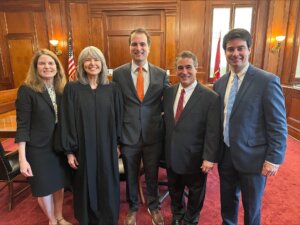SkyKick v Sky – A Briefing on the Latest Developments – K&L Gates LLP
The UK Supreme Court has recently delivered its judgement in the long-running SkyKick and Sky trade mark dispute. This decision will have significant implications for brand owners’ trade mark filing and enforcement strategies. In particular, when filing UK trade mark applications, applicants will have to consider that the goods and services claimed have a commercial justification to avoid vulnerability to bad faith claims.
Background
In the underlying case, Sky, a British broadcaster, sued SkyKick, an email and cloud storage company, for trade mark infringement. SkyKick responded by alleging that Sky had acted in bad-faith in claiming protection for goods in which it did not have a commercial interest or operate. The High Court initially ruled that Sky had acted in bad-faith and that Sky’s trade marks were partially invalid. However, it also found that SkyKick infringed Sky (remaining rights) to its trade mark. The registration should not be invalidated if there is a finding of bad faith in relation to some goods/services. Specifically, bad faith is established when:
“The applicant had the intention either of undermining, in a manner inconsistent with honest practices, the interests of third parties, or of obtaining, without even targeting a specific third party, an exclusive right for purposes other than those falling within the functions of a trade mark”.
In turn, the Court of Appeal ruled Sky had not acted in bad faith and dismissed SkyKick’s cross-appeal in relation to infringement, leading to this week’s long-awaited judgment.
Supreme Court Decision
The Supreme Court allowed the appeal in part. The Supreme Court upheld the High Court decision that Sky trade marks were applied for partially in bad faith. Sky had adopted an over-claiming strategy and was not able to show any commercial interest in or intention to use the marks for some of the specifications.
The decision highlighted that lengthy specifications per se will not lead to a finding of bad faith, but that this is dependent on all the relevant circumstances. The circumstances can include the length, scope, and nature of the specification, as well as the trademark owner’s brand, business, evidence of intended usage, and overall filing strategy. These factors may show:
“The motive or intent of the applicant was that they engaged in conduct that deviated from accepted principles of ethics or honest commercial practices with regard to the purposes the trademark system”. The Supreme Court ruled that the Court of Appeal erred in finding that SkyKick had not infringed Sky’s marks with respect to the ‘cloud back-up’ services. In this case, Supreme Court argued the claim “electronic mailing services” did not cover “cloud migration”. SkyKicks ‘cloud backup’ services could be considered falling within the scope of the Sky trade marks. With respect to SkyKicks ‘cloud backup’ services, these could be considered falling within the scope of the specifications for which the Sky trade marks was registered.
Lastly, the decision touched upon the jurisdiction of the UK courts after Brexit and confirmed that UK courts are acting as EU trade mark courts until the conclusion of the pending cases involving EU trade marks before them.
Conclusion
Following this decision, we expect a renewed focus on bad faith claims in enforcement and litigation involving trade mark registrations covering a wide range of goods and services in particular for older registrations. This decision will likely lead to a renewed focus on bad faith claims in enforcement and litigation involving trade mark registrations covering a wide range of goods and services, especially for older registrations.






